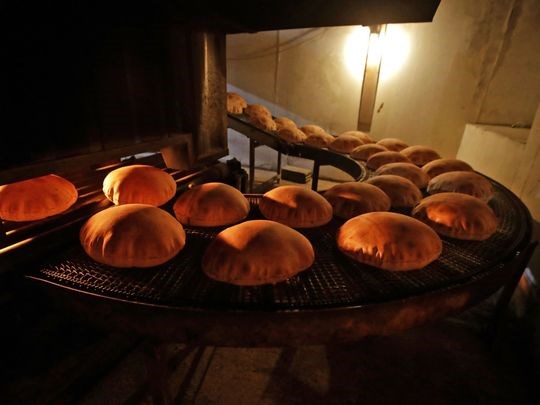Arabs fear for wheat supplies after Ukraine crisis
The crisis in Ukraine has economic consequences on the Arab region, limiting the supply of wheat to already economically threatened countries.
-

Arabs fear for wheat supplies after Russia advances to Ukraine.
The escalation of the situation in Ukraine may result in the bread wheat shortage in Egypt, Lebanon, Yemen, and other Arab countries where millions already struggle to make ends meet.
Wheat supplies from the two countries at odds are critical to the region's stability, and any shortages of the essential grain might spark instability.
If those supplies are disrupted, "the Ukraine crisis could trigger renewed protests and instability" in several Middle East and North Africa countries, the Washington-based Middle East Institute stated.
Omar Al-Bashir, Sudan's longstanding leader, was overthrown by his military in 2019 under pressure from large demonstrations sparked by a tripling of the bread price.
Sudan is already dealing with anti-coup rallies on a regular basis, but it appears that the government has taken the initiative to avert demonstrations over bread.
When Russia launched its operation on Thursday, Sudan's ruling Sovereign Council's second-highest official was in Moscow to explore commercial ties.
Yemen
For millions in Yemen, where a seven-year war has pushed the country to the verge of famine, bread is already a luxury.
"Most people can barely afford the basic foods," and the war in Ukraine will only "make things worse", Walid Salah, 35, a civil servant in Sanaa, told AFP.
According to US Department of Agriculture estimates, Russia is the world's leading wheat exporter, with Ukraine coming in fourth.
The crisis pushed the wheat price to 344 euros ($384) per tonne in European trading on Thursday, much above its previous peak.
According to David Beasley, Executive Director of the World Food Programme, the Ukraine-Russia region contributes half of the agency's grains. "The war is going to have a dramatic impact."
'Supplies won't last'
Syria
According to the World Food Programme, 12.4 million people live in conflict-torn areas. Syria is also experiencing food insecurity. Syria produced enough wheat to feed its population before the war on the country broke out in 2011, but crops plummeted, forcing the country to rely more on imports.
"Syria imported some 1.5 million tonnes of wheat last year, largely from Russia," The Syria Report, an economic publication, said this month.
Damascus claims to be working on distributing the stockpiles over the next two months.
Lebanon
A 2020 port explosion wrecked huge areas of Beirut, including silos carrying 45,000 tonnes of grain, and the country is engulfed by a financial crisis that has left more than 80% of the population in poverty.
Lebanon's current stock, in addition to five ships from Ukraine waiting to be offloaded, "can only last for one month and a half," said Ahmad Hoteit, the representative of Lebanon's wheat importers.
He told AFP that Ukraine supplied 80% of Lebanon's annual wheat imports of 600,000 to 650,000 tonnes and that the country had only been able to store approximately a month's supply of wheat since the port bombing.
The US might be a substitute source, but shipments could take up to 25 days instead of seven, according to Hoteit.
Morocco and Tunisia
Morocco's Budget Minister, Fouzi Lekjaa, told the media that the government would increase flour subsidies to $400 million this year and stop imposing import tariffs on wheat in the Maghreb, where wheat is used to make couscous and bread.
With large debts and little currency reserves, neighboring Tunisia does not have such luxury. Ships transporting wheat refused to unload their cargo because they had not been paid, according to local media in December.
According to agriculture ministry expert Abdelhalim Gasmi, Tunisia imports 60% of its total wheat consumption from Ukraine and Russia. He claims that current stockpiles will last until June.
'Bread riots'
Algeria, Africa's second-largest wheat user and the world's fifth-largest grains importer, claims to have a six-month stockpile.
Egypt is the world's largest wheat importer and Russia's second-largest customer. According to S&P Global, it purchased 3.5 million tonnes in mid-January.
The Arab world's most populous country has begun to buy from other countries, particularly Romania, although Russia and Ukraine still account for 80% of their imports.
Egypt still has nine months of stock to feed its more than 100 million people, government spokesman Nader Saad said. But he added, "We will no longer be able to buy at the price before the crisis."
For the 70% of the population that receive five subsidized pieces of bread per day, this is a gloomy omen.
The government is considering raising the price of the subsidized food, which has been fixed at five piastres (0.3 cents) for the previous three decades, to bring it closer to the production cost.

 5 Min Read
5 Min Read











